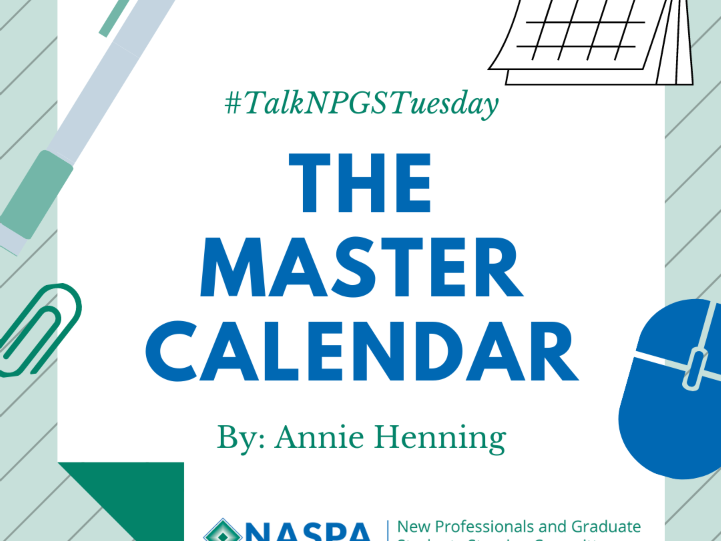
The Master Calendar
Career and Workforce Development New Professionals and Graduate Students Graduate New Professional
July 5, 2022
As a member of a large family, I am used to the controlled chaos of negotiating multiple schedules. One thing that kept my family on track was my mom’s planner. It had EVERYTHING – every holiday, birthday, co-curricular activity, work-shift, etc.. If I wanted to know what was happening that day, I would look at her calendar. As a new professional, I’ve adapted this “master calendar” to my professional development. This master calendar has been beneficial for numerous reasons, but the foremost reason is its use as a reflective tool.
Here is how I create/update my professional development master calendar each year.
-
Create (or Find) a Calendar Format
I’m old-school and like a good lined or bullet journal piece of paper and a scrap piece of paper. Then, equally divide or space each section to create my months. I personally prefer my master calendar to be generalized in nature since my position is programming centered and unpredictable in timeframe. However, a calendar template from Word or a Google search can be a substitute as well.
-
Mark the Important Dates and Milestones
Next, I note all the significant responsibilities/deadlines throughout that year that I want to prioritize. This includes busy times, my annual vacation, and important milestones/deadlines.
-
Fill the Calendar
In pencil, I now start adding all the developmental experiences you want to participate into the month(s) which it is applicable. This may include continued educational programs, conferences, and organizational leadership roles/short-term committees, etc.. Note that if you are participating in something for longer than a month, I encourage you to to write that commitment in each month of its term/obligation.
-
Revise and Reflect
This is the most important step, so take your time here. When I make my master calendar, this step can take hours if not days. I intentionally allocate copious amounts of time for this step so I can both feel and research all the programs/experiences. Because if I feel overwhelmed (or anxious) with the visualized, listed commitments, I’m certain that I will be exhausted when the time comes for it to be a day to day reality.
Reflection did not come naturally to me as a graduate student or even as I began my professional role. It’s a skill I’m continuing to hone. These are the questions which made an impact as I began to explore my professional development.
-
What are my values, interests and goals? Are the items that I listed in alignment with one (or more) of these? If not, where do they differ and is that difference something which could be toxic?
-
What is feasible? As graduate students and new professionals, we have limited resources, particularly in finances and time. Make sure you are being strategic about where you invest your resources and researching what scholarships may be available to you.
-
Where am I (professionally, emotionally, personally, etc.)?
-
Where/when do I feel most fulfilled or content?
-
Am I wanting to take on new challenges and diversify my skills and/or do I want to become more specialized?
-
Do I want to build my identity outside of the profession? Do I want to invest more in my personal relationships and non-SAHE skills?
-
Make It a Reality
Congratulations! You have now completed the most intense stage of making the master calendar. Now, you get to make it a reality! I start this step by writing my selected/discerned experiences in pen/sharpie (or you could print it out). Then, keep it in a visible but not a routine place (like in the back of my planner) so I can easily access it without feeling pressured to add more to my calendar.
A master calendar is a tool, which when utilized thoughtfully, allows you to hear all the perspectives and review all the options in front of you. Moreover, creating your master calendar is an opportunity to think about what gives meaning and precedent in your life. What will your master calendar look like?
Author: Annie Henning (she/her) is a Program Coordinator at Saint Louis University and serves on the New Professional and Graduate Students Steering Committee. She earned her B.S. in Corporate Communication with a minor in Business Administration from Southeast Missouri State University and M.S. in Student Affairs in Higher Education from Missouri State University. When not on campus, she enjoys watching Food Network and the latest episodes of her fandoms as well as baking treats.